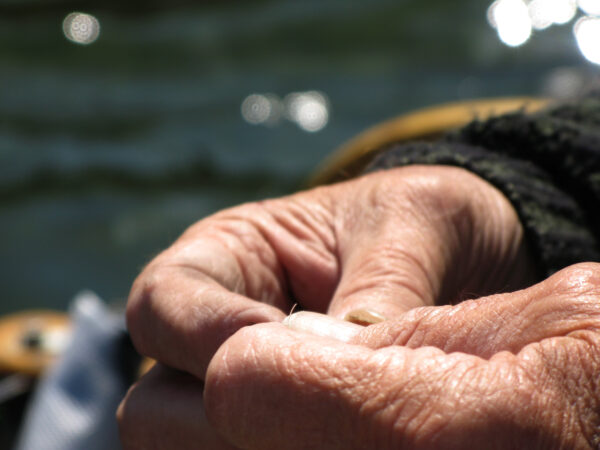Father’s Day is meant to shine a light on the special relationship children have with their fathers.
We think that is true whether your father is with you now … or not.
That’s why we are honored to share with you a story this Father’s Day weekend from an author who eloquently shares his reflections on his dad and Esophageal Cancer.
When I think of my father, I remember his hands. Liver-spotted and dexterous, hands that tied flies and built wooden toys for children at Christmas. Those hands that palmed my chest and stomach when I learned to swim now cannot break free of the bedrails—or of the esophageal cancer that slowly strangles him.
It is late March 2006, and the nurse has tied my father’s hands to steel bedrails so that in his morphine-induced state he won’t pull out his IV. Needle pricks from three weeks in the hospital have left the backs of his hands bruised and yellowed. I look at his hands and remember how strong they used to be, how so many things I know how to do came from watching his hands. My father was a teacher. Not by trade but by nature. He understood the catch-phrase “teachable moment” better than most educators.
I am five or six, freezing in an ice shack on the Kennebec River, smelts sizzling in a frying pan close by. His hands busy tying flies, he says, “You should help one person each day.”
Years later, in the front yard, with a rake in his hand, he tells me “Marry your best friend, son. That’s what I did.”
The lectures didn’t end when I grew up, either. I even looked forward to his monthly phone calls, sure to find a lesson somewhere. He would make sure I was replacing the windows the right way, or make sure I was not turning into “one of those awful Little League parents.” I would groan, “Dad, I’m thirty-five.” “And you still need a lecture,” he’d say. “Sad, isn’t it?”
His most important lesson didn’t come as a lecture. My sister and I stand in the hallway awaiting Dad’s return from the x-ray lab. They have taken him off the ventilator to see if the mechanical breathing apparatus allowed his lungs to rest and heal to where he can breathe on his own. We are praying for a miracle. At the sound of a bed coming toward us, wheels grinding dully, we look up. Dad raises his hand, and the nurse stops pushing the bed.
My chest gets tighter when I look down at him. He is bald, his eyes sunken. A month earlier, my daughters, ages eight and five, did not immediately recognize him.
“How are you doing?” As stupid as that question is, I can think of nothing else.
“It could be worse,” he says.
“It could be worse?” I repeat. “Dad, how the hell could this get any worse?”
“There was a little girl from the children’s cancer floor coming out of x-ray when I went in,” he says simply. “Looked like my granddaughter. That would be worse.”
We will sit with Dad during his final night, the distance between him and me widening like gaps between his final sandpaper breaths. At 7 a.m., the nurse will say the obvious, and I will look toward the ceiling as if watching Dad drive away after visiting his grandchildren. Only this time there will be no wave, just a disjointed feeling of permanence.
I believe dignity may be the most challenging attribute a parent can pass on to a child—dying with it, even more so. When the nurse wheels the bed away, Dad’s hands are no longer tied down. Now they are folded peacefully across his chest.
John R. Corrigan is the author of the Jack Austin PGA Tour mystery series, the Peyton Cote U.S. Border Patrol mystery series (writing as D.A. Keeley), which has been optioned for the screen, and the author of a stand-alone, This One Day (writing as K.A. Delaney). He is a longtime independent school educator, having worked as a teacher, coach, dorm parent, and administrator at Pomfret School, Northfield Mount Hermon, and is currently the Upper School Director of Detroit Country Day School. He and his wife are the proud parents of three daughters. You can learn more about him by visiting JohnRCorriganAuthor.com.

